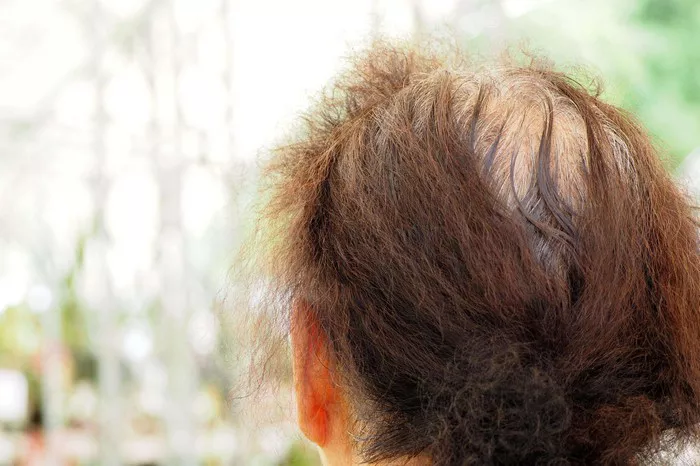Hair fall, a concern that many individuals face, can be a source of worry and stress. The thought of seeing hair strands falling from the root can raise questions and concerns about one’s overall health and well-being. In this comprehensive guide, we’ll explore the reasons behind hair fall from the root, helping you understand this common issue better. By shedding light on the causes and solutions, we aim to provide you with the knowledge needed to address hair fall effectively.
The Hair Growth Cycle: An Overview
To comprehend why hair falls from the root, it’s crucial to have a basic understanding of the hair growth cycle, which consists of three main phases:
1. Anagen Phase: The active growth phase, where hair grows from the root. This phase can last for several years.
2. Catagen Phase: A transitional phase where hair stops growing. This phase lasts a few weeks.
3. Telogen Phase: The resting phase, during which hair is released from the root and falls out. This phase can last a few months.
Common Causes of Hair Fall from the Root
Hair fall can be attributed to various factors, and it’s often a combination of several causes. Let’s explore some of the most common reasons why hair falls from the root:
1. Genetics: Hereditary factors play a significant role in determining your susceptibility to hair loss. If your family has a history of hair fall, you may be more prone to it.
2. Hormonal Changes: Hormonal fluctuations, such as those occurring during pregnancy, menopause, or thyroid issues, can lead to hair fall from the root.
3. Stress: High levels of stress can disrupt the hair growth cycle and contribute to hair loss.
4. Nutritional Deficiencies: A lack of essential vitamins and minerals, particularly iron and biotin, can weaken hair and cause it to fall from the root.
5. Medical Conditions: Certain medical conditions, such as alopecia areata, scalp infections, and autoimmune diseases, can lead to hair fall.
6. Harsh Hairstyling Practices: Excessive use of heat styling tools, tight hairstyles, and chemical treatments can damage the hair and cause it to fall out from the root.
Preventive Measures and Treatments
The good news is that many cases of hair fall from the root can be addressed and even reversed. Consider the following preventive measures and treatments:
1. Balanced Diet: Ensure you’re consuming a diet rich in essential nutrients, including protein, iron, and biotin, to support hair health.
2. Stress Management: Practice stress-reduction techniques, such as meditation, yoga, or deep breathing exercises, to maintain a healthy hair growth cycle.
3. Scalp Care: Keep your scalp clean and healthy by using a gentle shampoo and avoiding harsh chemical treatments.
4. Avoid Tight Hairstyles: Opt for looser hairstyles that don’t put excessive strain on your hair follicles.
5. Hair Care Products: Choose hair care products that are suitable for your hair type and free from harmful chemicals.
6. Professional Guidance: If your hair fall is severe, consider seeking professional advice from a dermatologist or hair specialist.
Home Remedies and Natural Solutions
Many individuals prefer natural remedies for hair fall issues. While these may not work for everyone, they can be worth trying:
1. Onion Juice: Applying onion juice to your scalp has been associated with hair growth due to its sulfur content.
2. Aloe Vera: Aloe vera gel can help soothe the scalp and improve hair health when applied regularly.
3. Essential Oils: Essential oils like lavender, rosemary, and peppermint can be diluted and massaged into the scalp to promote hair growth.
4. Egg Mask: An egg mask, rich in protein, can nourish the hair and strengthen it.
5. Green Tea: Rinse your hair with green tea, which contains antioxidants that may help stimulate hair growth.
When to Seek Professional Help?
While most cases of hair fall from the root can be managed with home remedies and lifestyle changes, there are situations where professional intervention is necessary. Consider consulting a specialist under the following circumstances:
1. Sudden and Severe Hair Loss: If you experience rapid and significant hair loss, it’s essential to seek medical advice.
2. Hair Loss Due to Medical Conditions: If hair loss is a symptom of an underlying medical condition, consult a healthcare professional to address the root cause.
3. No Improvement: If your hair fall continues or worsens despite trying home remedies, professional guidance is crucial.
See Also: Seasonal Phenomenon: Why Do I Lose So Much Hair in the Fall?
In conclusion
Understanding why hair falls from the root is the first step in addressing this common issue. Hair fall can have various causes, including genetics, hormonal changes, stress, and nutritional deficiencies. However, with proper care, preventive measures, and, in some cases, natural remedies, you can promote hair growth and reduce hair fall. Remember, it’s essential to consult a professional if you experience severe or unexplained hair loss to determine the underlying cause and receive appropriate treatment.


